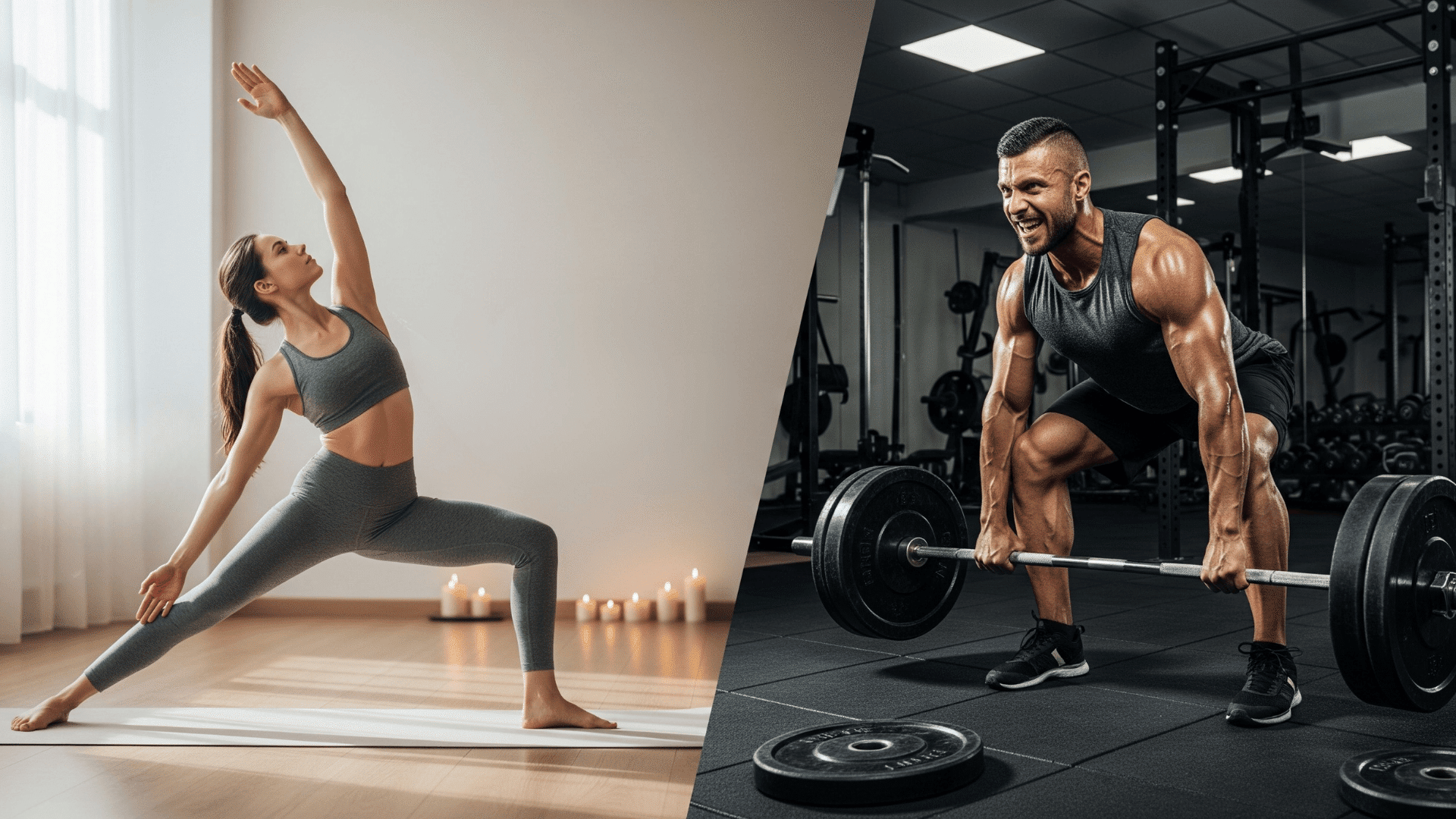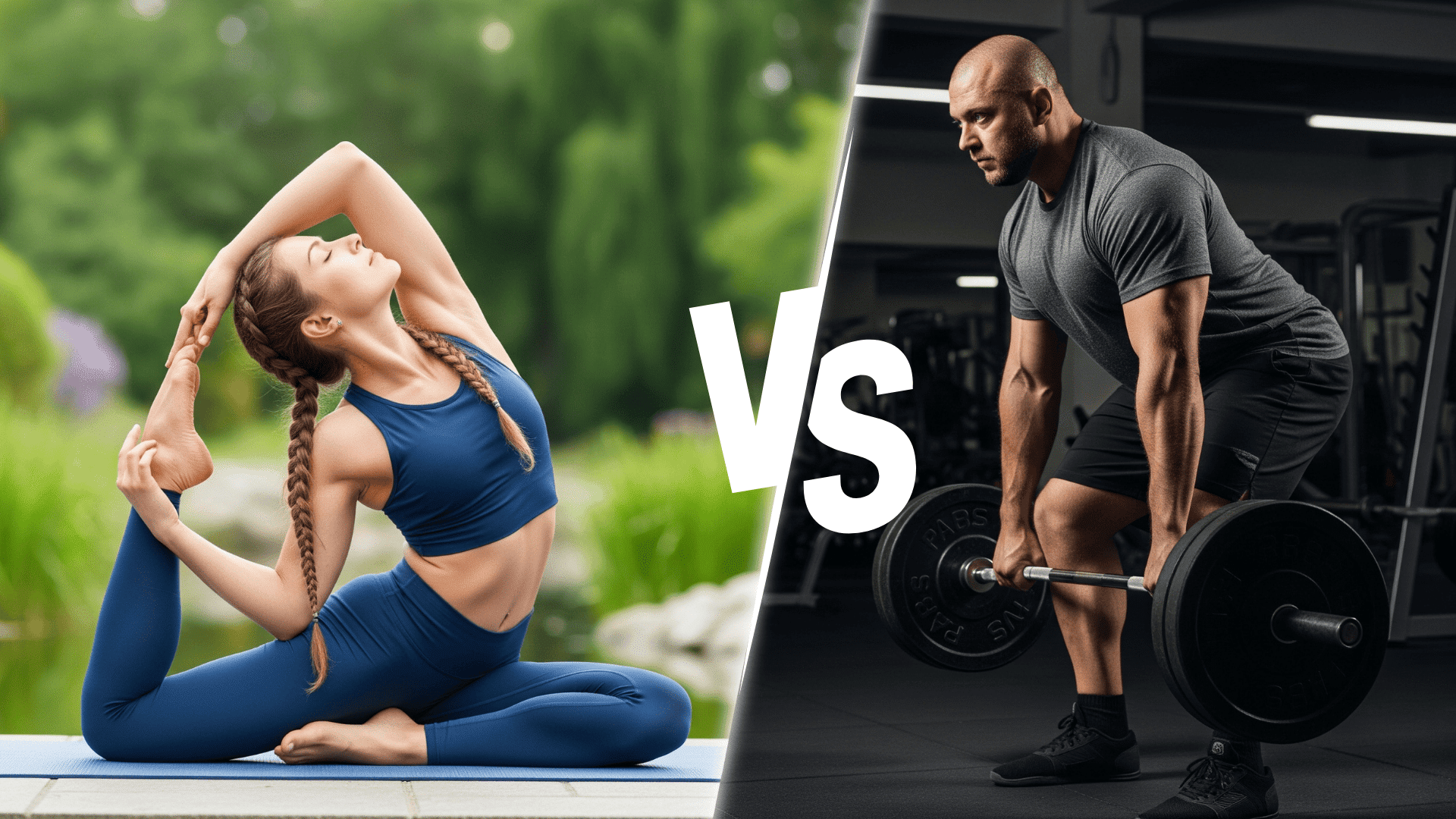Let’s be honest: the fitness world can be overwhelming.
Walk into any gym or scroll through social media, and you’ll see people passionately defending their chosen practice. Some swear by their morning yoga flows, while others can’t imagine life without their barbell routines.
But here’s the thing: yoga and weightlifting are both incredible ways to improve your health, and neither one is inherently better than the other. Each practice has changed millions of lives in its own unique way.
They’re just different tools for different goals.
Think of yoga as your mindful movement practice that connects breath with flowing poses, while weight lifting is your muscle-building powerhouse focused on progressive strength gains.
The best choice depends entirely on what you’re seeking from your fitness journey and what genuinely excites you.
What People Choose: Yoga or Weight Lifting?
So why do people fall in love with one over the other?
It usually comes down to what they’re seeking from their fitness routine.
Yoga attracts people who want more than just physical exercise; they’re looking for stress relief after brutal workdays, better flexibility, and that mind-body connection that makes them feel centered.
There’s something beautiful about a practice that doesn’t require gym memberships or fancy equipment.
Weightlifting draws in folks who love seeing tangible progress, want to build muscle and see their bodies transform in confidence-boosting ways.
There’s an undeniable satisfaction in lifting weights that felt impossible just months ago, plus the efficient calorie-burning benefits.
Understanding the Fundamentals of Each Practice

Let’s break down what these practices actually involve, because understanding the basics helps you determine which one resonates with you.
Yoga combines physical postures with breathing techniques and meditation practices that help quiet your mind.
If you’re holding challenging poses or flowing through gentle sequences, it’s all about maintaining proper alignment, cultivating breath awareness, and being fully present in your body.
Weight lifting uses external resistance to create muscle tension through progressive overload, gradually making things harder over time.
Your muscles adapt and grow stronger, and you celebrate victories with heavier weights and visible changes.
Both require dedication but offer completely different approaches to physical fitness and mental well-being.
Physical Benefits: What Each Practice Actually Delivers?
Here’s where things get interesting: both practices will change your body, but in different ways that serve unique purposes.
Yoga Benefits

Yoga is like a full-body tune-up that addresses issues most of us didn’t even know we had.
Your flexibility improves dramatically, your balance gets better, and those poses that look effortless are secretly strength training in disguise.
Your core gets rock-solid, posture improves, and nagging aches from desk work start disappearing.
The injury prevention benefits are real; when your body is more flexible and aware, you’re less likely to hurt yourself in daily life.
Weight Lifting Benefits

Weight lifting is your muscle-building, strength-gaining, metabolism-boosting superhero.
If you want to add lean muscle to your frame, there’s simply no substitute for progressive resistance training.
Your bones get stronger, preventing osteoporosis later in life.
The metabolic benefits are incredible; more muscle means burning more calories even while binge-watching Netflix.
Weightlifting builds functional strength that translates directly to real life, making everything from carrying groceries to playing with kids easier when you’re genuinely strong.
Yoga vs Weightlifting: Mental and Emotional Differences
Yoga cultivates mindfulness and inner peace through breath awareness and meditation, while weightlifting builds confidence and mental resilience through goal achievement and physical empowerment.
Yoga:
Yoga emphasizes present-moment awareness, stress reduction, and emotional balance through mindful movement and breathing techniques.
It promotes flexibility not just physically but mentally, encouraging acceptance and letting go of tension.
The practice fosters introspection, spiritual connection, and a calm, centered state of mind that extends beyond the mat.
Weightlifting:
Weightlifting builds mental toughness, discipline, and self-confidence through progressive overload and measurable achievements.
It provides stress relief through physical exertion and releases endorphins that boost mood.
The practice fosters goal-oriented thinking, persistence, and a sense of personal empowerment, cultivating mental resilience that enables individuals to overcome life’s challenges.
Which Practice Matches Your Personality?

Understanding your natural tendencies helps determine which practice will feel more sustainable and enjoyable for your unique personality type.
| PERSONALITY TRAIT | YOGA | WEIGHT LIFTING |
|---|---|---|
| Goal Orientation | Process-focused, journey-oriented | Results-driven, milestone-focused |
| Social Preference | Community-minded, group classes | Independent or training partner |
| Stress Response | Seeks calm, mindfulness | Seeks physical release, intensity |
| Time Preference | Flexible, flowing sessions | Structured, efficient workouts |
Your personality significantly influences which practice becomes a lasting habit.
If you enjoy quiet reflection and going with the flow, yoga might feel like home.
If you love setting goals, tracking progress, and pushing limits, weightlifting could be your calling.
Yoga vs Weight Lifting: Limitations
While both practices offer tremendous benefits, understanding their limitations helps set realistic expectations and identify potential gaps in your fitness routine.
Limitations of Yoga
Despite its many benefits, yoga has specific constraints that may not meet all fitness goals.
- Limited resistance for significant muscle hypertrophy compared to progressive weight training
- Primarily uses body weight, which may not provide adequate stimulus for strength gains
- Upper body development particularly challenging without additional resistance
- Most styles don’t provide sustained cardiovascular challenges for heart health
- May not burn as many calories as high-intensity weight training sessions
- Limited improvement in anaerobic capacity and explosive power
Limitations of Weight Lifting
Weightlifting excels in many areas but falls short in others that affect overall wellness and movement quality.
- Can reduce range of motion if not paired with adequate stretching and mobility work
- May create muscle imbalances without proper programming and attention to movement patterns
- High-intensity training can increase cortisol levels and stress on the nervous system
- Requires longer recovery periods between sessions, limiting training frequency
- May not address mental health and emotional well-being as comprehensively as yoga
Combining Both: The Hybrid Approach

Here’s where things get really exciting: you don’t have to choose just one!
Many of the most successful, well-rounded fitness enthusiasts use both practices strategically.
Think of weight lifting as your strength foundation and yoga as your recovery and mobility work.
You might lift weights three times weekly to build muscle and strength, then use yoga sessions to maintain flexibility, reduce stress, and help your body recover.
This combination addresses every aspect of fitness: building strength, maintaining mobility, supporting mental health, and creating sustainable routines that don’t beat up your body.
The key is finding the right balance for your goals and schedule.
Making Your Choice Stick Long-Term
Here’s the truth nobody talks about enough: the best fitness practice is the one you’ll actually do consistently.
You could have the most scientifically perfect program in the world, but if you hate it, you won’t stick with it.
Start with what genuinely excites you; that enthusiasm is your secret weapon for building lasting habits.
Set realistic expectations and focus on small, consistent improvements rather than dramatic changes.
Take progress photos, track how you feel, or simply notice how much easier daily activities become.
Create supportive environments by joining classes, finding workout buddies, or setting up dedicated spaces at home.
Remember that your needs may evolve over time, and that’s perfectly normal.
The Last Line
Both yoga and weightlifting offer incredible benefits for your physical and mental health, but they serve different purposes and appeal to different personalities.
Yoga provides a holistic approach to wellness with an emphasis on flexibility, mindfulness, and stress relief.
Weightlifting excels at building strength, muscle mass, and confidence through measurable progress and physical challenges.
The beauty is that there’s no wrong choice here, only what’s right for you at this moment in your life.
Maybe you’re drawn to the peaceful flow of yoga, or perhaps the empowering challenge of weightlifting calls to you.
You might even find that combining both practices creates the perfect balance for your goals and lifestyle.








